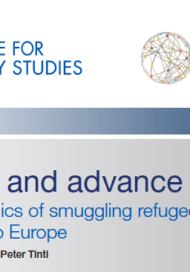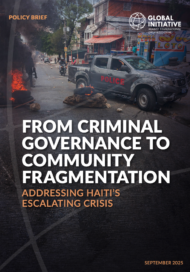Posted on 02 Dec 2015
Since 2011 Europe has faced a mounting migration crisis that has played out firstly on its borders, and then within them. A perfect storm of events, including the protracted war in Syria and subsequent mass displacement, instability caused by the Arab Spring, the disintegration of the Libyan state, the withdrawal of international troops in Afghanistan and persistent extremist insurgencies in sub-Saharan Africa, has prompted a scale of human movement that has not been seen since the end of World War II. In the past four years, more than a million citizens from four regions – the Middle East, Africa, Asia and the extra-Schengen area of Europe – have targeted central and northern European countries to claim refuge and seek new opportunities for themselves and their families. At the time of writing this report, the UN estimates that 700 000 migrants have arrived in Europe by sea in 2015 alone. They are moving away from conflict, terrorism, repressive regimes and varying degrees of poverty and lack of opportunities towards the relative safety and prosperity of Europe. In doing so, many have put their lives at grave risk, while others have died as they seek to evade heightening physical and political barriers.
Those making the journey to Europe are assisted by a rapidly proliferating set of smuggling networks that have different shifting sets of motives, nationalities, ways of operating and levels of criminality. The failures of Europe and the broader international community allow these smugglers to benefit from exacerbating the crisis by inciting migration and using unscrupulous practices, such as abuse, extortion and violence, to seek profits.
What role do smugglers play?
Despite deploying task forces, fusion cells and warships, law-enforcement agencies have failed to keep up with the chaotic and rapid multiplication of actors involved in the crisis. The multilateral system has been incapable of providing critical support to the needy, developing political solutions to the various crises or ensuring that legal obligations towards those in need of protection are met.
This report, “Survive and Advance: the economics of smuggling migrants and refugees into Europe” which is a joint publication by the Global Initiative and the Institute for Security Studies (ISS), and funded by the Hanns Seidel Foundation (HSF) in Germany, strives to provide a substantial, policy-orientated contribution to the evidence basis around Europe’s current migration crisis.
The report draws upon both the authors’ experience, and that of the Global Initiative Network of Experts, as well as investigations conducted in 10 countries, interviews with law-enforcement and government officials, experts, analysts, practitioners, smugglers and migrants. The study undertook nearly 200 long-form, semi-structured interviews with migrants in six locations along the main routes to Europe and in migrant destination countries (Libya, Egypt, Greece, Italy, Germany and Sweden). These provided an unprecedented and detailed understanding of the motivations and modus operandi of both migrants and smugglers. By building the evidence base in areas where the least is known, this report seeks to help policymakers chart out a stronger response to the crisis.





